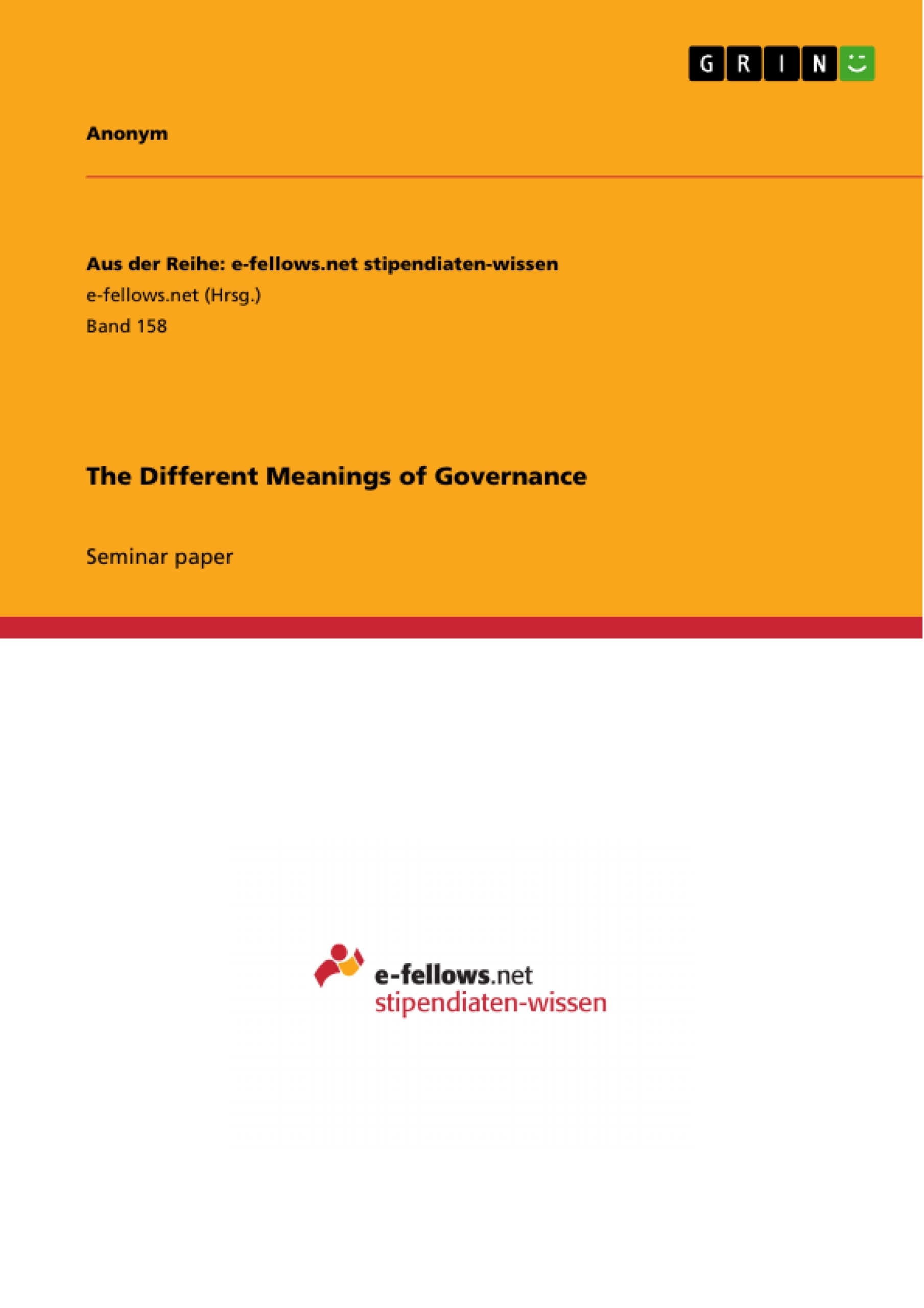Governance is more than an extensively used buzzword of social science literature over the last 20 years. Even though its manifestations have actually existed since the origin of human social thinking, it was not until recently that the concept was adopted, based on an understanding of the genuine realm of governance, encompassing the various facets of its existence. Consequently, work on governance reflects the interest of the social science community in a shifting pattern of governing styles (Stoker 1998).
It is this vast array of phenomena related to governance, which creates confusion and misperception about its actual meaning. Rhodes (1997, 52) points to this problem as it “would seem that governance has too many meanings to be useful”. Systemic, managerial, political and further dimensions of governance compete for a functional definition. Hereby, the meaning is often fitted to a context which does not reduce its ambiguity. Hence, academic literature on governance is eclectic and relatively disjointed (Jessop 1995). The theoretical roots are among institutional economics, international relations, organizational studies, development studies, political science, and public administration. Moreover, it can be interpreted as descriptive term, analytical concept, and normative constitution (Nuscheler 2009, 9).
This essay, unconstrained by any context of a particular study discipline or academic field, investigates different meanings of governance in a more theoretical manner. It aims at discussing some of the most widely used applications of the concept of governance in order to identify diverging strands of meaning as well as common assumptions. For this purpose, the paper looks at governance interpreted as voluntary exchange in the political arena. It explores the meaning of governance as code for a minimal state, and it includes further the connotation of governance as good governance in a separate section. A final point will discuss corporate governance as yet another application field of governance from a business perspective. The main features of each of the four meanings will allow in the conclusion to assess in how far governance has a common understanding in social sciences.
Inhaltsverzeichnis (Table of Contents)
- Introduction
- Governance as Voluntary Exchange
- Governance: The Minimal State and Outside Supplements
- The Meaning of Governance as Good Governance
Zielsetzung und Themenschwerpunkte (Objectives and Key Themes)
This essay examines the various meanings of "governance" in a theoretical manner, analyzing its applications in different contexts and identifying common themes and assumptions. It delves into the concept of governance as voluntary exchange in the political arena, explores governance as a code for a minimal state, and discusses the connotation of governance as good governance. Additionally, it examines corporate governance from a business perspective.
- Different meanings of "governance" across disciplines
- Governance as a process of political exchange and coalition building
- The concept of a minimal state and its role in governance
- The importance of good governance for development and prosperity
- The influence of non-state actors on governance processes
Zusammenfassung der Kapitel (Chapter Summaries)
- Introduction: This section establishes the context for the essay, highlighting the increasing use and diverse interpretations of the concept of "governance." It points to the ambiguity of the term and explores its theoretical roots in various disciplines.
- Governance as Voluntary Exchange: This chapter examines governance from a political perspective, focusing on how individual preferences and resources are converted into collective action through policy coalitions and voluntary exchanges among citizens. It analyzes the role of coalition building and the influence of external factors on the governance process.
- Governance: The Minimal State and Outside Supplements: This section explores the meaning of governance as a code for less government, recognizing the limitations of purely governmental rule in tackling national and global issues. It discusses the increasing blurring of boundaries between the public and private sectors and the trend towards a "networked minimalism" in a globalized world.
- The Meaning of Governance as Good Governance: This chapter examines the World Bank's perspective on governance, tracing the evolution of the concept from the initial focus on political power to the broader framework of good governance. It highlights the normative stance adopted by the World Bank and emphasizes the importance of good governance for development and prosperity.
Schlüsselwörter (Keywords)
The key themes and concepts explored in this essay include governance, political exchange, coalition building, minimal state, networked minimalism, good governance, development, and the role of non-state actors in governance processes. It examines how these concepts are interwoven in different contexts and analyzes their implications for understanding the complex dynamics of governing in the contemporary world.
Frequently Asked Questions
What is the core difference between "Government" and "Governance"?
While "Government" refers to formal state institutions, "Governance" is a broader term encompassing the processes, networks, and interactions between state and non-state actors to achieve collective goals.
What does "Governance as Voluntary Exchange" mean?
It views governing as a process where different political actors and interest groups form coalitions and exchange resources to reach a consensus on policy decisions.
How is "Good Governance" defined in international development?
Popularized by the World Bank, Good Governance refers to a normative framework emphasizing transparency, accountability, the rule of law, and efficiency as prerequisites for economic prosperity.
What is the concept of the "Minimal State" in governance?
It suggests a shift towards less direct government intervention, where the state acts more as a facilitator within a network of private and public organizations.
What is Corporate Governance?
Corporate Governance is the application of governance principles within the business sector, focusing on the rules and practices by which a company is directed and controlled.
- Quote paper
- Anonym (Author), 2010, The Different Meanings of Governance, Munich, GRIN Verlag, https://www.grin.com/document/176310



